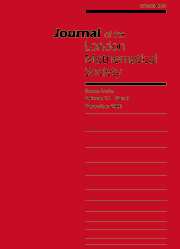Article contents
INVARIANT SULLIVAN–DE RHAM FORMS ON CYCLIC SETS
Published online by Cambridge University Press: 01 April 1998
Abstract
Let Y be a topological space; and suppose that the circle group, S1, which will be denoted by G throughout this paper, is acting on Y. Then the equivariant cohomology H*G(Y) of Y is defined to be H*(YG), where YG=(EG×Y)/G, the Borel construction. Because of the bundle map YG→BG, the cohomology H*G(Y) is an H*(BG)-module. With rational coefficients H*(BG; ℚ)=ℚ[u], where deg(u)=2. And, when Y is a reasonably nice finite-dimensional space, for example, a finite-dimensional G-CW-complex, then the localized module H*G(Y; ℚ)[u−1] is isomorphic to H*G (YG; ℚ)[u−1] via the restriction homomorphism, where YG⊆Y is the fixed point set. (See, for example, [2].) That this very useful Localization Theorem does not generalize to infinite dimensional spaces can be seen by taking Y=EG, for example.
- Type
- Notes and Papers
- Information
- Copyright
- The London Mathematical Society 1998
- 1
- Cited by




